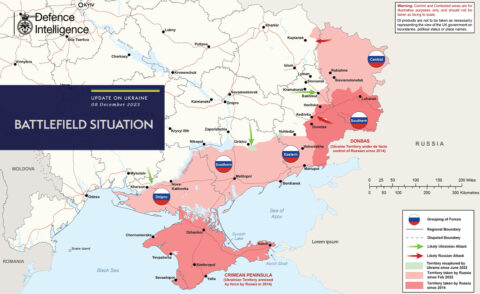In The Line, Andrew Potter notes just how quickly cross-partisan support has eroded since the summer, and especially since the Hamas atrocities in Israel on October 7th:
Well, you can’t say Volodymyr Zelenskyy didn’t try. With a new U.S. aid package for his country frozen by a Republican filibuster, the president of Ukraine made a last-ditch visit to Washington to plea, as he has done so often, for help against the Russian invasion. But unlike previous visits, he was treated more as yesterday’s annoyance than a global statesman fighting for the cause of freedom.
The wheels came off the bus of Western support for Ukraine gradually, then suddenly. The slow distancing from Ukraine has been underway since last summer, but it was finally pushed off the cliff in the wake of the barbarism of Hamas on October 7. Since then, the world’s attention, effort, and in important cases, arms, have been focused on the Middle East. But also, the intensely polarizing character of the Israel-Hamas war has hardened political divisions in almost every country, in a way that has largely destroyed what had been, in many countries, a cross-partisan consensus on Ukraine.
But for all its slow-motion inevitability, it is still shocking to see just how quickly support for Ukraine evaporated, how hollow the promises have been revealed to have been, how ugly the finger pointing has got, and how unprepared NATO, the EU, and the West as a whole are for the danger that is staring them in the face.
Let’s start with a basic fact: the Ukrainian counteroffensive, which began in early summer with so much dramatic hope, has failed. The goal was to drive to the Black Sea, split the Russian forces in half, and begin the work of retaking the sovereign Ukrainian territory that had been seized by Russia since 2014.
It didn’t happen, and it didn’t even come close. Why that is the case has been, and will be, the subject of intense scrutiny and analysis, but what seems clear is that the Russians were given too much time to dig in and lay minefields tens of kilometres deep across the front lines. In the absence of sufficient airpower to achieve air superiority over the battlefield, the attacking Ukrainian forces became sitting ducks to Russian artillery, helicopters, and drones.
So the fight is at a stalemate. The commander of the Ukrainian army, Valerii Zaluzhnyi, said as much in an article he wrote for The Economist at the beginning of November. President Zelenskyy has admitted it as well, as has the head of the Ukraine war cabinet.
This failure need not have been a disaster. Success in battle is never guaranteed, the enemy always gets a vote, and there is nothing stopping the Ukrainians from tending their wounds, burying their dead, and trying again.
Nothing, that is, except the fecklessness, the division, and the bad faith of Ukraine’s partners in the West. Instead of sitting down to figure out what went wrong, adjusting and increasing their aid accordingly, and recommitting to the fight, the whole so-called alliance has degenerated into infighting, blame shifting, and ass-covering. The Washington Post recently had a whole series devoted to giving anonymous American “senior officials” plenty of acreage to underbus the Ukrainians, who were, allegedly, too slow to start the counteroffensive, too cowardly when it finally began, too incompetent in their execution, and too stubborn to listen to the Americans advising them.
This all may be true. But something else is also true: The West, for all its promises to back Ukraine to the hilt, to stand by it through thick and thin, to do whatever it takes as long as it takes, has not done any of this. Support, in the form of arms deliveries, training, aid, ammunition, what have you, has been slow, grudging, performative, and inadequate to the task.




